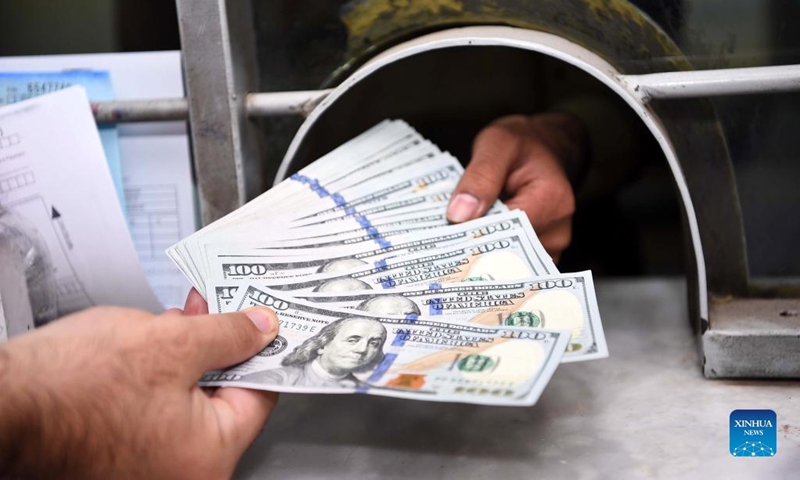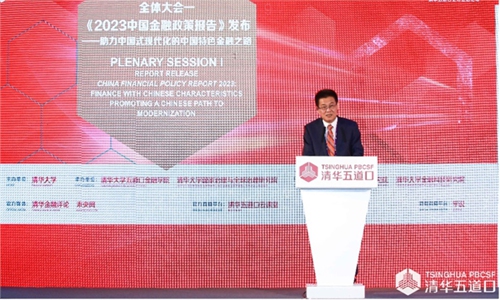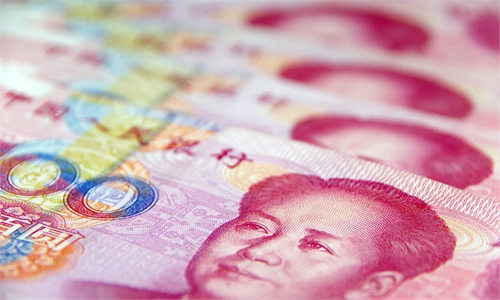Asian Clearing Union to reportedly launch SWIFT alternative in June amid accelerated de-dollarization push
More diversified cross-border settlement mechanism needed amid accelerated de-dollarization push: experts

A currency changer gives U.S. dollar notes to a customer in Rawalpindi, Pakistan, on July 29, 2022. (Photo: Xinhua)
The Asian Clearing Union (ACU) will reportedly launch a new cross-border financial messaging system in June as an alternative to SWIFT, marking another major move from global economies and organizations opting for new payment mechanisms amid the accelerated global de-dollarization push.
Deputy governor of Central Bank of Iran Mohsen Karimi said that the payment system is capable of completely replacing SWIFT and could facilitate the global de-dollarization push, RT reported on Thursday, citing the Iranian newspaper Kayhan.
The new financial system will be used only by ACU member states but other countries could apply for membership, per the RT report.
The ACU was established in 1974 as a payment arrangement through which participants settle payments for intra-regional transactions among the participating central banks on a net multilateral basis, according to ACU's official website.
ACU currently has nine members including India, Iran, and Pakistan.
Experts highlighted the US failure in securing international positions for its currency as a result of its aggressive rate hikes and huge trade deficit as the major causes for the global de-dollarization trend.
Multiple emerging economies have been decreasing their holdings of US dollar assets and reducing the use of US dollars for international settlements while further diversifying their foreign reserves, reflecting a declining trust from global economies in making settlements in US dollars, Liang Haiming, dean of Hainan University's Belt and Road Research Institute, told the Global Times on Friday.
Pan Helin, joint director of the Research Center for Digital Economics and Financial Innovation affiliated with Zhejiang University's International Business School, said that the US' inability to maintain the international status of its currency also contributed to the trend, adding that he expected the US dollar to continue to weaken.
Amid the current de-dollarization push, the global monetary system will shift toward a more inclusive direction and seek more diversified payment settlements, Liang said, adding that the reported ACU system is just a representation of this trend.
Meanwhile, Pan stressed that the major development direction for the global payment system will be an increase in memberships and enhanced convenience of cross-border payment, which will gradually replace the function of the US dollar and SWIFT in the sector and offer an additional choice to users worldwide.
BRICS - Brazil, Russia, India, China and South Africa - asked the New Development Bank (NDB) to provide guidance on a how a potential new shared currency might work, while the use of alternative currencies was among the prominent talking points during the BRICS foreign ministers' meeting held in Cape Town, the legislative capital of South Africa, Bloomberg reported.
Proposals are being considered by NBD officials, and the bloc "will be guided to them as to what the future models might be," per the Bloomberg report, citing Naledi Pandor, South Africa's minister of international relations.
Brazilian President Luiz Inacio Lula da Silva meanwhile proposed creating a common currency in the region, during a recent meeting with South American heads of state, CNN reported.
"If there is a currency that can replace the US dollar in the international arena in the future, the currency should be beyond countries, economic alliances, and political alliances under a system that is recognized and used by the majority of the world in order to dominate the global market for the long run," Liang noted.
In addition to forming new cross-border payment mechanisms, multiple organizations and economies have also been bolstering their approach to local currency settlements.
The NDB will expand its outreach and fund more of its projects in local currencies to support the development of emerging economies, Dilma Rousseff, the bank's president, said on Tuesday, adding that the dual objective was strengthening the member countries' domestic markets and "protecting our borrowers from the risks of currency fluctuations," the Xinhua News Agency reported.
In contrast with the de-dollarization push, the internationalization of the Chinese yuan has been further elevated, winning favor with a rapidly growing number of global partners.
The first branch of Bank of China (BOC) in Papua New Guinea opened on Thursday, making it the first launched by a Chinese bank in a South Pacific island country.
BOC's Chairman Ge Haijiao met with the Acting Governor of the Bank of Papua New Guinea, Elizabeth Genia, and noted that BOC will further deepen bilateral cooperation and trade in yuan settlements and other aspects related to the China-proposed Belt and Road Initiative.



